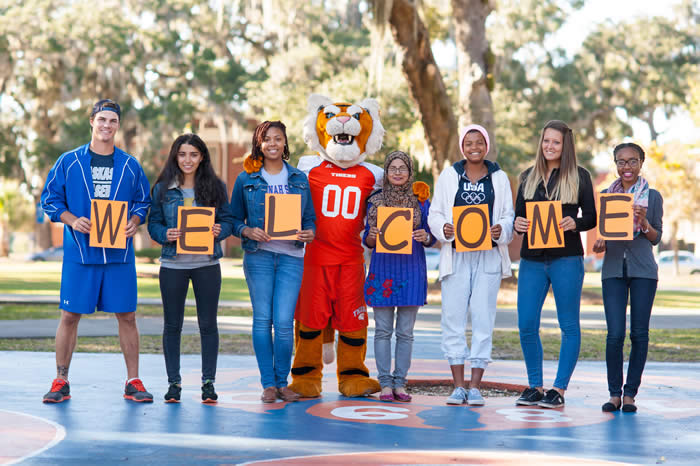
Explore HBCU – Savannah State University
Savannah State University is a public historically black university in Savannah, Georgia.
Background
Originally called the Georgia State Industrial College for Colored Youths, the school was founded in 1890 as a result of the Second Morrill Land Grant Act that mandated southern and border states develop land-grant colleges for black citizens.
A preliminary session of the college was held in the Baxter Street School Building in Athens, Georgia before moving to Savannah, Georgia, at which point Richard R. Wright Sr. was appointed the first president of the institution. The first baccalaureate degree was awarded in 1898 to Richard R. Wright Jr., and 30 years later the college became an official four-year, degree-granting institution, choosing to end its high school programming.
When the University System of Georgia (USG) was established in 1932, the college became one of the first members of the system and its name was changed to Georgia State College. The name then changed to Savannah State College in 1950, receiving accreditation from the Southern Association of Colleges and Schools (SACS) in 1955 before the USG elevated the status of the school from college to university. In 1996, the school was officially renamed Savannah State University.
Today, Savannah State is the oldest historically black university in the state of Georgia, offering numerous programs ranging from undergraduate to graduate degree study.
Programs & Opportunities
In 1968, Savannah State University established the city’s first master’s degree program in elementary education, also becoming the first institution in Savannah to receive accreditation from the National Council for Accreditation of Teacher Education (NCATE). The university also launched an innovative program in marine sciences for both undergraduate and graduate course study in 1979.
Now, SSU offers over 30 programs ranging in focus from business, education, communications, social sciences and health professions, and much more. The university currently plays in Division I of the National Collegiate Athletic Association (NCAA), while hosting all nine of the national pan-hellenic council organizations.
Learn about Savannah State University’s programs and opportunities here.
Alumni Affairs
Savannah State University seeks to help develop productive members of a global society, and as such SSU’s alumni range in industry across the global scale. Some notable alumni include, but are not limited to:
- Alissa J. Johnson, PhD., earned a Bachelor of Science in Math from Savannah State and served as the former Deputy Chief Information Officer of the Executive Office of the Obama Administration.
- Jerome Miller earned a Bachelor’s in Economics from Savannah State and is the retired Vice President for Diversity and Inclusion at Toyota Motor Inc.
- Kareem McMichael earned a Bachelor’s of Fine Arts in Mass Communication; TV & Radio from Savannah State, and now acts as a News Content Specialist, Actor, and Film Producer. Kareem is also the Online Content Manager for Savannah State University’s Journalism and Mass Communications department.
- Annie B. Andrews earned a Bachelor of Science in Criminal Justice from Savannah State University. She is a retired U.S. Navy Rear Admiral and the director of the Total Force Requirements Division—currently she serves as the Assistant Administrator for Human Resource Management for the U.S. Federal Aviation Administration.
Financial Information
Savannah State University reports tuition rates per credit hour as $169.33 and $616.07 for in-state and out-of-state undergraduate students, respectively. For graduate students, tuition rates per credit hour are $196.00 and $726.00 for in-state and out-of-state students, respectively.
In total, the cost of attendance (tuition, fees, and annual cost) averages to $17,414 for in-state residents and $28,136 for out-of-state residents before the application of financial aid.
Conclusion
For 130 years, Savannah State University has strived to meet the educational needs of the community. The school works to foster an engaged learning environment, all while highlighting its African American legacy and nurturing the growth of its increasingly diverse student population.
Learn more about Savannah State University’s offerings here.
Sources:
- https://www.findmyhbcu.org/school/savannah-state-university/
- https://www.savannahstate.edu/about-ssu/history.shtml
- Alissa: https://www.linkedin.com/in/dralissajay
- Jerome: https://web.archive.org/web/20070928013320/http://www.hispanicprwire.com/news.php?l=in&id=5442&cha=2
- Kareem: https://www.linkedin.com/in/kareem-mcmichael-20886539
- Annie: https://www.faa.gov/about/key_officials/andrews
- https://www.savannahstate.edu/bursar/tuition/index.shtml
- https://simba.savannahstate.edu/students/netpricecalculator/
Pictures:
- Logo: https://ssuathletics.com/
- SSU Hill Hall: https://www.savannahstate.edu/
- SSU Students: https://hbcuconnect.com/colleges/76/savannah-state-university
- SSU Sutent Welcome: https://www.savannahstate.edu/english-language-institute/
